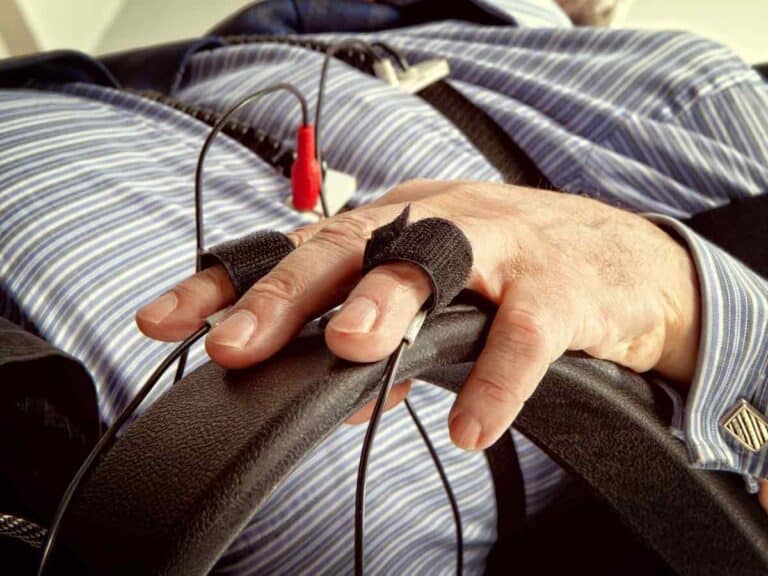Can a Heart Condition Affect a Polygraph?
One of the things that make a lie detector test work is that the machine used in administering it can measure cardiovascular functions such as the blood pressure and heart rate. It also monitors respiratory activity, which the heart can influence. Does this mean you can’t undergo a polygraph examination if you have a heart condition?
Certain medical conditions can affect a polygraph. They include coronary heart disease, valve disease and arrhythmia, which can cause increased heart rate, or hypertension, which can cause elevated blood pressure. As a matter of fact, some people with medical conditions are prohibited from having a lie detector exam.
Got a heart-related issue and fear that it may cause a false positive and/or affect your cardiovascular health?
Then see to it that you don’t stop reading now. In this post, I will discuss certain heart conditions and the effect they have, if any, on a lie detector test. It’s not enough that you know how to manage the problem with your ticker — it’s also a definite must to know whether or not you should push through with that polygraph test.

Effect of Hypertension on Polygraph
More commonly known as high blood pressure, hypertension is something that can increase your risk for certain heart conditions as well as worsen existing ones. And it can have an impact on the outcome of a polygraph exam in a couple of ways: having increased blood pressure reading and taking medications for it.
Deception can cause stress to the body, which can increase the blood pressure. It’s exactly because of this why a lie detector machine can give an idea that the person who is attached to it is telling a lie.
A person who has hypertension has high blood pressure all the time.
Especially if the presence of the condition is not established or acknowledged properly during the pre-test phase of the polygraph exam, it can make the individual appear lying even when he or she is being truthful. So, in other words, a false positive result can be kept at bay by an experienced polygrapher.
Other than dietary and lifestyle changes, hypertension is also commonly managed with medications. And this can affect a lie detector test since high blood pressure medications lower the blood pressure and, usually, the heart rate, too.
With blood pressure and heart rate that do not respond that much to changes, such as when being deceitful that typically elevates various physiologic processes as a result of the activation of the fight or flight response, it’s not unlikely for the polygraph examiner to get an inconclusive or false negative result.
Read Also: 8 Reasons When Lie Detector Test Can Be Wrong
Effect of Arrhythmia on Polygraph
Simply put, arrhythmia is an irregular heartbeat. It occurs when the electrical signals that cause the heart to beat are not coordinated, thus causing a faster heart rate (tachycardia) or a slower heart rate (bradycardia). In some instances, arrhythmia can also cause an irregular heart rate — sometimes fast, sometimes slow.
Because one of the things that a lie detector machine measures and records is the number of times the heart beats per minute, it’s plain to see why having arrhythmia can affect the result.
The problem with arrhythmia is that it can come with other symptoms that can also affect a polygraph.
Anxiety, for instance, is something that is commonly experienced by many individuals with arrhythmia. And when it strikes while the person is undergoing a polygraph exam, it may be mistaken for deception due to an increase in both the blood pressure and heart rate. Anxiety can also affect respiratory activity, which a polygraph machine monitors, too.
One more thing that can accompany arrhythmia is sweating, which can be picked up by the lie detector machine through the pair of galvanometers attached to 2 of the examinee’s fingers.
According to health authorities, most cases of arrhythmias are harmless. But then there are also those that can increase a person’s risk of suffering from a stroke or cardiac arrest.
If the individual who is about to undergo a lie detector test has severe arrhythmia, he or she may be disqualified from taking it. Otherwise, a medical emergency may strike if the examination proves to be too stressful for the heart. In some instances, a medical clearance from one’s cardiologist may be warranted beforehand.
Effect of Valve Disease on Polygraph
Besides arrhythmia, a few other heart conditions can also cause a person’s heart to race most of the time. And one of them is valve disease. Also sometimes referred to as valvular heart disease in the medical community, it occurs when any of the valves of the heart — the heart has a total of 4 valves — is damaged or diseased.
In some instances, valve disease is congenital, which means that it may be present at birth. But then it can also occur in adults as a result of various causes and conditions such as infections and heart-related problems.
Because valve disease can cause a rapid heart rate, it may interfere with a proper polygraph result.
The trouble with this heart condition is that it can also have an impact on the blood pressure, which is one of the things that a polygraph machine measures. Some individuals with valve disease have elevated blood pressure, while others who suffer from it have lowered blood pressure. It all depends on which valves of the heart are affected.
Effect of Coronary Heart Disease on Polygraph
When heart specialists talk about coronary heart disease, they refer to the blockage or interruption of the blood supply to the heart because of a build-up of plaque or fatty substances in the coronary arteries — blood vessels that deliver oxygenated blood to the muscles of the heart.
There are numerous risk factors for coronary heart disease. Some of them include obesity, unhealthy eating, physical inactivity and smoking tobacco. It can run in families, too.
Health experts say that about 47% of all coronary heart disease cases can be blamed on hypertension.
So, in other words, there is a huge possibility for someone with the said heart condition to also have high blood pressure, which can affect a lie detector exam one way or the other. This is true whether it’s left uncontrolled or managed with the help of medications. By the way, it can also cause rapid heart rate, which can also impact the polygraph test.
And it’s exactly because it can increase the number of times the heart beats per minute why beta blockers are some of the most common medications for people with coronary heart disease. Simply put, beta blockers are medications used for regulating the heart rhythm as well as lowering the blood pressure.
Coronary heart disease can increase a person’s risk of suffering from a heart attack or stroke. And due to this, someone who has it is usually not allowed to undergo a lie detector test as it can be very stressful.
Just Before You Have a Polygraph Test
Prior to being asked questions answerable with a yes or no, the polygraph examiner will attempt to establish your physical, psychological and physiological history in order to determine whether or not you are fit to take a lie detector test. During this part, which is referred to as the pre-test phase, any medical conditions should be disclosed.
If you have a serious heart condition and fear for your health and safety, make sure that you consult your doctor beforehand or inform the individual who is requesting you to take a polygraph test.
Related Questions
Can obesity affect a polygraph exam?
The weight has no bearing or influence on the result of a lie detector test. However, it’s a different story if the individual has certain medical conditions that can result from being overweight. Some of them include high blood pressure and type 2 diabetes, both of which can affect a lie detector test.
Should I be honest when taking a lie detector test?
One of the best ways to pass a polygraph examination is by telling the truth. Because the result is private, only a few people have access to it. Also, it’s important to note that being honest about past wrongdoings may not necessarily cause serious repercussions, such as when applying for a job.






